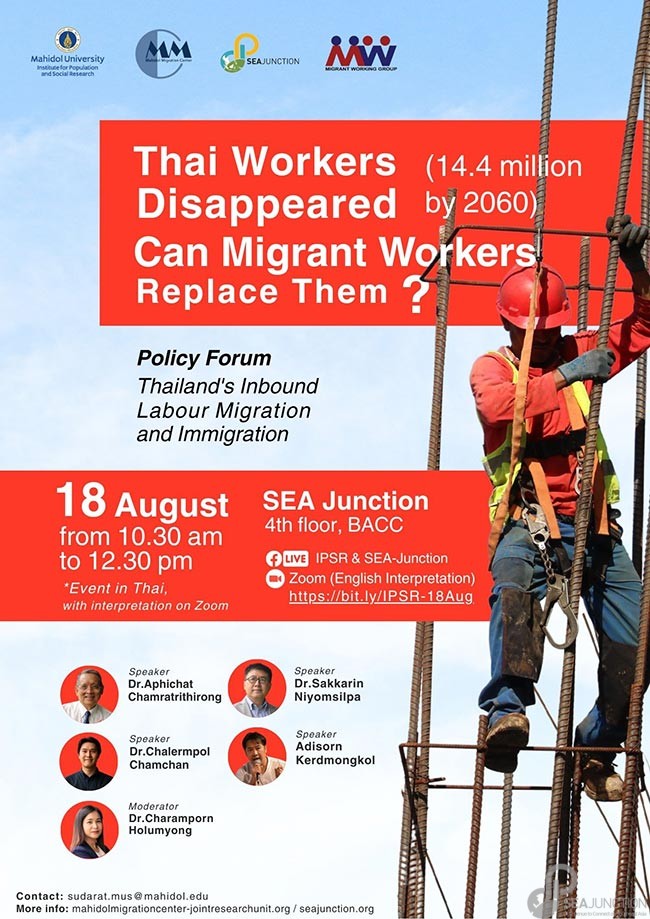
- This event has passed.
As Thai Workers Disappear, Can Migrant Worker Replace Them?
18 August, 2023 @ 10:30 am - 12:30 pm
The Institute for Population and Social Research (IPSR) at Mahidol University conducted a study on immigration and migrant workers, led by Emeritus Professor of Demography Apichat Chamrasritthirong. The study projects that by the end of the 21st century, Thailand’s population will decrease by 50%, leaving less than 30 million people, making it the second country after Japan with such a significant decline. This projected decline poses economic challenges and threatens the standard of living in Thailand if the country fails to integrate foreign professional workers, immigrants/refugees, and migrant workers into the workforce.
In 2001, the United Nations introduced a replacement migration policy as a demographic tool for countries facing low birth rates. Developed nations with birth rates below the replacement level, such as the United Kingdom, Germany, the United States, Canada, and Australia, have already increased their populations through relaxed immigration policies. These countries had established clear immigration policies and targets before the United Nations proposed such measures, enabling them to import much-needed skilled and low-wage workers. Consequently, Thailand should adopt a replacement migration policy by setting a quota of 200,000 foreigners per year to obtain Thai citizenship over an 80-year period. This approach aims to restore the Thai population to 16 million people, mitigating the 50% loss in the working population. The need for immigrants to replace 100% of the loss is not absolute, as Thailand can employ other strategies, such as integrating seniors more actively into the workforce by raising the retirement age, leveraging technology like robotics and artificial intelligence, and sharing labor resources for ASEAN regional integration.
Recognizing the significance of this issue, the Institute for Population and Social Research (IPSR) at Mahidol University, in collaboration with SEA Junction and the Migrant Working Group, is organizing a policy recommendation forum to shed light on the projection that 14.4 million Thai workers may disappear by 2060 and to explore the question whether migrant workers could replace them. The event will take place in Thai on 18 August 2023, 10.30 am- 12.30 pm at SEA Junction, 4th floor, Bangkok Art and Culture Centre (BACC) and will be live-streamed on their Facebook pages. English interpretation will be available on Zoom (accessible via the link at https://bit.ly/IPSR-18Aug).
| 10.30 –10.40 am | Registration |
| 10.40 – 10.55 am | Opening remarks: Mahidol Migration Center – Joint Research Unit, SEA Junction, and Migrant Working Group |
| 10.55 – 11.05 am | Import 200,000 Aboard: Challenge or Opportunity
Dr.Aphichat Chamratrithirong |
| 11.05 – 11.15 am | Skilled Migrant Policies
Dr.Sakkarin Niyomsilpa |
| 11.15 – 11.25 am | Assessing the Situation of Migrant Children and the Impact of COVID-19
Dr.Chalermpol Chamchan |
| 11.25 – 11.35 am | The issue of human rights violation necessitating labor rights compliance in law requiring rethinking immigration laws and long-term migrant integration into Thai society and workforce
Adisorn Kerdmongkol |
| 11.35 am – 12.15 pm | Q&A session |

Organizers
Institute for Population and Social Research, Mahidol University is one of Asia’s premier population research and training hubs. The Institute conducts research and provides training in population and development and explores their relationship to the social, economic, reproductive health, medical, and public health fields. This allows the Institute to help address emerging issues in Thailand and neighboring countries in south-east Asia and beyond, with the ultimate goal of improving the quality of life for all. More information at https://ipsr.mahidol.ac.th/.
SEA Junction, established under the Thai non-profit organization Foundation for Southeast Asia Studies (ForSEA), aims to foster understanding and appreciation of Southeast Asia in all its socio-cultural dimensions, from arts and lifestyles to economy and development. Conveniently located at Room 407-8 of the Bangkok Arts and Culture Center or BACC (across MBK, BTS National Stadium), SEA Junction facilitates public access to knowledge resources and exchanges among students, practitioners and Southeast Asia lovers. For more information, see www.seajunction.org, join the Facebook group: http://www.facebook.com/groups/1693058870976440/ and follow us on Twitter and Instagram @seajunction.
Migrant Working Group (MWG) was formed as a result of member organizations recognizing the injustice in the registration of foreign labor in the social security system in the year 2006. This realization led to the organization’s awareness of the power of working together as a network. Its mission is to ensure that the migrant workers has access to rights and ensure a good quality of life, while respecting human dignity and without discrimination. More information at https://mwgthailand.org/.



